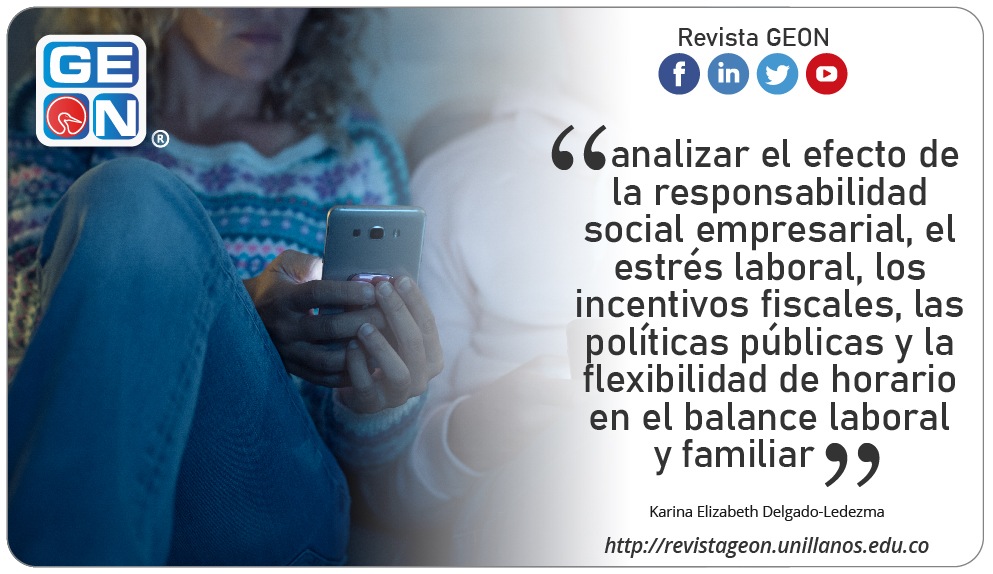Determinantes del balance laboral y familiar en Monterrey, México
Determinants of work and family balance in Monterrey, Mexico.
Contenido principal del artículo
Resumen
El presente artículo analiza los determinantes que intervienen en el balance laboral y familiar en el municipio de Monterrey en el Estado de Nuevo León, México. Diversos estudios recientes señalan que dicho balance es crítico para poder lograr un equilibrio en el individuo. Por consiguiente, asociaciones civiles e instituciones mexicanas han tenido un impacto en el desarrollo de las políticas públicas sobre el balance laboral y familiar, que ha derivado en modificaciones de estatutos y leyes de diferentes países con un enfoque en la armonía entre el trabajo y la familia. Por lo tanto, el objetivo del artículo es cuantificar los determinantes que inciden en el balance laboral y familiar. Específicamente, se pretende analizar el efecto de la responsabilidad social empresarial, el estrés laboral, los incentivos fiscales, las políticas públicas y la flexibilidad de horario en el balance laboral y familiar. En este estudio se entrevista a 103 empleados y por medio de la técnica de análisis factorial se encuentra que la responsabilidad social de la empresa donde trabajan, así como el estrés laboral tienen un impacto directo en la variable dependiente, mientras que la práctica de las variables de incentivos fiscales, políticas públicas y flexibilidad de horario presentan un impacto no significativo.
Descargas
Detalles del artículo
Palabras clave
Referencias
Allen, T. (2001). Family-Supportive Work Environments: The Role of Organizational Perceptions. Journal of Vocational Behavior, 58(3), 414-435. https://bit.ly/3mzpwLA
Boyer, S. L., Maertz, C. P., Mosley, D. C., Carr, J. C., & Keough, S. (2003). Work-family conflict: The impact of moderators on the demand-conflict relationship. Academy of Management Meeting.
Brough, P., & O’Driscoll, M. P. (2010). Organizational interventions for balancing work and home demands: An overview. Work & Stress, 24, 280-297. https://bit.ly/2JKH6xP
Chan, X. W., Kalliath, T., Brough, P., Siu, O. L., O’Driscoll, M. P., & Timms, C. (2016). Work-family enrichment and satisfaction: The mediating role of self-efficacy and work–life balance. The International Journal of Human Resource Management, 27(15), 1755-1776. https://bit.ly/33GLogG
Chioda, L. (2016). Work and family: Latin American and Caribbean women in search of a new balance. The World Bank.
Dahlsrud, A. (2008). How corporate social responsibility is defined: An analysis of 37 definitions. Corporate Social Responsibility and Environ-mental Management, 15, 1-13. https://bit.ly/3lKzjgQ
Diario Oficial de la Federación (2018). Norma Oficial Mexicana 035. Factores de riesgo psicosocial en el trabajo-identificación, análisis y prevención. https://bit.ly/3qq8x0u
Eby, L. T., Casper, W. J., Lockwood, A., Bordeaux, C., & Brinley, A. (2005). Work and family research in IO/OB: Content analysis and review of the literature (1980–2002). Journal of Vocational Behavior, 66, 124-197. https://bit.ly/36Dc7wE
Edwards, J. R., & Rothbard, N. P. (2000). Mechanisms linking work and family: clarifying the relationship between work and family constructs. Academy of Management Review, 25, 178-199. https://bit.ly/3lFoGLW
Felstead, A., Jewson, N., Phizacklea, A., & Walters, S. (2002). Opportunities to work at home in the context of work‐life balance. Human Resource Manegement Journal, 12(1), 54-76. https://bit.ly/3oivMrF
Fleetwood, S. (2007). Why work-life balance now? International Journal of Human Resource Management, 18(3), 387-400. https://bit.ly/2JHJsxi
Frone, M. R., & Yardley, J. K. (1996). Workplace family‐supportive programmes: Predictors of employed parents' importance ratings. Journal of Occupational and Organizational Psychology, 69(4), 351-366.
Gallup. (2017). State of the global workplace. https://bit.ly/3lxIpxe
Greenhaus, J. H., Collins, K. M., & Shaw, J. D. (2003). The relation between work-family balance and quality of life. Journal of Vocational Behavior, 63, 510-531. https://bit.ly/2I7w0ST
Guest, D. E. (2002). Perspectives on the study of work-life balance. Social Science Information, 41(2), 255-279. https://bit.ly/39LIiMp
Haar, J. M. (2013). Testing a new measure of work–life balance: A study of parent and non-parent employees from New Zealand. The International Journal of Human Resource Management, 24, 3305-3324. https://bit.ly/33HoYMc
Hirschi, A., Shockley, K. M., & Zacher, H. (2019). Achieving work-family balance: An action regulation model. Academy of Management Review, 44(1), 150-171. https://bit.ly/3mQEixu
Howson, M. & O’Driscoll, M. P. (1996). Satisfaction with childcare and job-family conflict: Implications for absenteeism lateness, and turnover intentions [tesis no publicada, Universidad de Waikato, Hamilton, Nueva Zelanda].
Jiménez, B. M., Vergel, A. I. S., Muñoz, A. R., & Geurts, S. A. E. (2009). Propiedades psicométricas de la versión española del cuestionario de interacción trabajo-familia (SWING). Psicothema, 21(2), 331-337. https://hdl.handle.net/2066/76872
Leung, Y. K., Mukerjee, J., & Thurik, R. (2020). The role of family support in work-family balance and subjective well-being of SME owners. Journal of Small Business Management, 58(1), 130-163. https://bit.ly/3ophxB8
Marks, S. R., & MacDermid, S. M. (1996). Multiple roles and the self: a theory of role balance. Journal of Marriage and the Family, 58(2), 417-432. https://bit.ly/2IeQqJW
Organización de las Naciones Unidas. (2020). Objetivos de desarrollo sostenible. https://bit.ly/3lDqTb0
Panwar, R., Rinne, T., Hansen, E., & Juslin, H. (2006). Corporate responsibility: Balancing economic, environmental, and social issues in the forest products industry. Forest Products Journal, 56 (2), 4-12. https://bit.ly/3g9qcVO
Secretaría del Trabajo y Previsión Social. (2018). Modelo de Reconocimiento de Empresa Socialmente Reponsable. https://bit.ly/36DHVkN
Sirgy, M. J., & Lee, D. J. (2018). Work-life balance: An integrative review. Applied Research in Quality of Life, 13(1), 229-254. https://bit.ly/3ojTV0Y
Stock, R., Bauer, E.-M., & Bieling, G. (2014). How do top executives handle their work and family life? A taxonomy of top executives´work-family balance. The International Journal of
Human Resource Management, 25(13), 1815-1840. https://bit.ly/39CP1rO
Torres-Flórez, D. (2019). Estrategia de compensaciones como herramienta de satisfacción laboral. Revista GEON (Gestión, Organizaciones Y Negocios), 6(2), 4-9. https://doi.org/10.22579/23463910.181
White, M., Hill, S., McGovern, P., Mills, C., & Smeaton, D. (2003). ‘High‐performance’management practices, working hours and work–life balance. British Journal of Industrial Relations, 41(2), 175-195. https://bit.ly/3lBYMsI


 PDF
PDF
 FLIP
FLIP
 Html
Html











